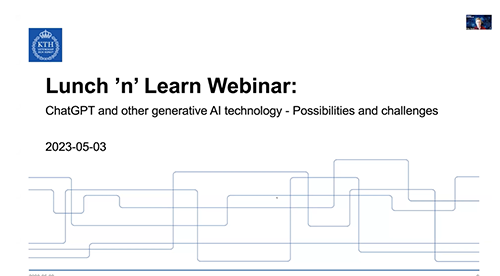ChatGPT and other generative AI technology – possibilities and challenges
Documentation from Lunch 'n' Learn 3 May 2023
The public launch of the chatbot ChatGPT in late 2022 significantly heightened awareness about generative Artificial Intelligence (AI) and its potential. Consequently, it is reshaping our perceptions around the utilization of digital technology. Professor Peter Parnes (Luleå University of Technology) presents the latest developments in the area, along with some of its promises for the future of artificial intelligence. How can these kinds of tools be used in education and how should its limitations be mitigated?
About the webinar
After the introduction of ChatGPT by OpenAI, there has been a spike in the interest in the capabilities of generative artificial intelligence, as well as the challenges it can bring about. Generative AI can produce anything from text and computer code to pictures, videos, and music, as well as 3D models and worlds. Based on OpenAI’s software, there have been other developments, such as GitHub’s CoPilot, which can significantly speed up the programming and coding process. Additionally, generative AI capabilities will soon be part of Microsoft’s suite of products, since the company owns 49% of OpenAI, the creators behind ChatGPT.
Finally, there are some points on the effort to regulate AI, especially after the European Union has proposed tough rules that set requirements for transparency and responsibility in AI use.
ChatGPT in the classroom
In the classroom, ChatGPT can help students answer their questions in real time, as well as ask for immediate feedback on their work. Additionally, the support of multiple languages can facilitate the learning of students from different (linguistic) backgrounds. However, ChatGPT also has its limitations: the free (GPT3.5) version is slower and less accurate than the paid (GPT4) version, and it overall interpolates text, creating non-factual sentences sometimes.
Difficult to detect cheating using control tools
As for cheating, at the moment it is not totally safe to say that a student has cheated using AI using the free or premium tools that have been created, as they can only provide a probability that a text has been created using AI. Looking towards the future, areas that can be improved are problem solving and decision-making, as well as emotional intelligence and personalisation when it comes to AI.
Some questions from the presentation
What is ChatGPT by OpenAI and what can it do?
How can ChatGPT be implemented in the classroom?
What are some of the major limitations of ChatGPT and its underlying GPT3 model?
What does OpenUni.ai offer?
How can cheating be accounted for in a ChatGPT era?
What does the future hold for generative artificial intelligence?
Some questions raised during the discussion
(*not included in the recording)
- What is GPT-4 and how can it affect the future of certain jobs/professions?
- Can ChatGPT invent its own language?
- Since original and creative thinking is an important part of learning, how can we ensure that students do not use GPT software but continue to think on their own?
- How can we fight bias (distortion, prejudice, etc.) such as sexism and racism?
Table of contents of the video
Here is a list of links that serve as a table of contents for the recording. Click on the link for the part you want to watch. When you get to KTH Play, click on the play button, and the video will start in the right place. All links lead to KTH Play. Please note that the videos are in Swedish.
01:35 Introduction to the talk
03:52 ChatGPT by OpenAI and its uses
10:31 Non-textual forms of AI uses (image and video/audio, coding)
18:26 ChatGPT in the classroom
35:10 Artificial intelligence integrations beyond ChatGPT


